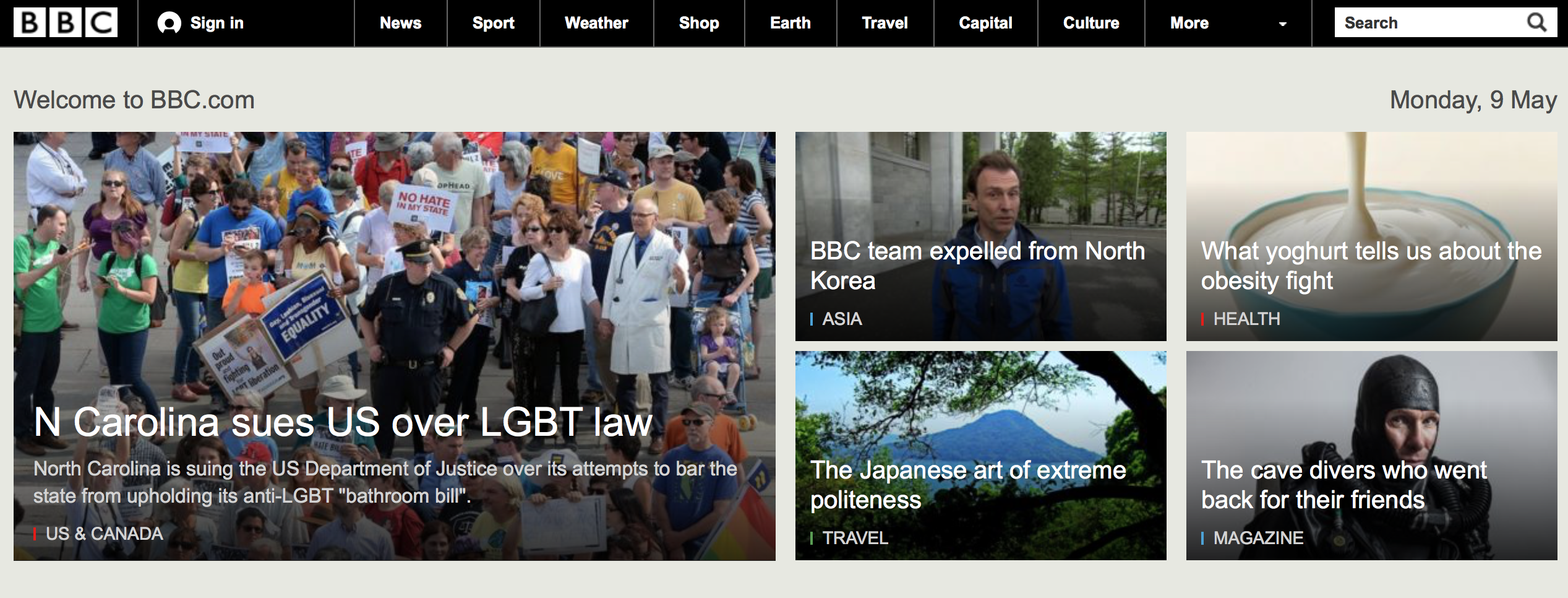This analysis is not a commentary about North Carolina’s controversial bathroom law, but the irresponsible and unethical news reporting about it. I am appalled by the headline and dek of a BBC story posted earlier today. Quoting the latter: “North Carolina is suing the U.S. Department of Justice over its attempts to bar the state from upholding its anti-LGBT ‘bathroom bill'”.
While many people might agree with “anti-LGBT” as descriptor, BBC nevertheless shouldn’t use it. Doing so makes a value judgement and demonstrates bias rather than neutral news reporting. Even using LGBT without the “anti” is biased. Also, as a foreign news agency, regardless reputation, the Beeb makes moral pronouncements that may not reflect those of the country that it reports about. The headline and dek implicitly impose values, and that should not be the news report’s goal—all while diminishing, if not ignoring, the rationale behind the legislation.
Stated differently: Many people may never read beyond the hede and dek, so they leave with the impression that the law absolutely discriminates. The story text is better balanced, but still lopsided, presenting enough information for some of the folks reading. Too bad that many people never will.
Contrast with CNN’s headline: “North Carolina sues U.S. Justice Department over bathroom bill”. The Beeb’s: “N Carolina sues US Justice Department over LGBT law”. CNN’s dek: “North Carolina casts its so-called bathroom bill as a ‘common sense bodily privacy law’. The federal government calls it discrimination, pure and simple”. The American news org keeps more neutral tone, and the story is more probing, presenting several points of view about the law and responses to it.
Playing Southern Stereotypes
To reiterate: I take no stand for or against the law, or what it might or might not represent. My profession is the problem. Too much of the news reporting I have seen about the controversy—well beyond BBC—pits progressive, humanitarian thinking against narrow-minded, discriminating North Carolina legislators. That’s the narrative, portraying the folks down South as homophobic white supremacists.
Excuse me, has no one heard of the Research Triangle—Chapel Hill, Durham, and Raleigh—where is one of the highest concentration of PhDs in the world? This isn’t a state of hicks, as many bloggers, news reporters, gay activists, or social media boomers would have you believe.
Purely for argument’s sake, presenting one alternative rationale for the law: Transexuals are a literal minority of the population—meaning they are few in numbers. That’s not to be confused with news reporting characterizing them as a discriminated minority because of the bathroom law. I am ambivalent about how lawmakers choose to designate gender roles (birth certificate), but doing so addresses a legitimate concern—and one generally and surprisingly ignored by a news media otherwise often obsessed with pointing out sexism against women: Many of them will feel unsafe using public restrooms alongside someone born male and still possessing the gender’s genitalia. Who looks out for the best interests of this majority of citizens—women who rightly can claim cultural discrimination here and abroad in far greater numbers? Legislators share that role for the constituency.
Should fear or unease define who has the right to use what bathroom? Perhaps not. But with gender roles and definitions changing, there must be some social or legal definitions. North Carolina errs with existing social precedents, as stated in the legislation: “Biological sex. The physical condition of being male or female, which is stated on a person’s birth certificate”.
Whether or not this, or another definition, should apply is the purview of citizens and policymakers to decide. Perhaps all bathrooms should be unisex, as they are in some other countries. Maybe all toilets should be single-use only, without gender designation, available on first-come basis. Such solutions could eliminate social stigmas and reduce potential legal lamentations.
The Overlooked Story
North Carolina’s response to the feds elevates the law to national status, and that should concern everyone because the core allegation is federal infringement on state’s rights, while questioning the bounds of the Civil Rights Act of 1964. Who is protected?
That is the news of the day lost in a headline and dek deciding that transgenders and, by the Beeb’s misuse of LGBT, anyone in the gay community is discriminated by the North Carolina legislation. In realistic reading of the law, discrimination against LGB is dubious at best. T is another matter, but not one that should be decided by haughty headlines and dirty deks.
BBC fails its responsibility to frame and present the news neutrally. Without bias and without prejudice. Today’s story is the worst kind of journalism.
